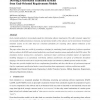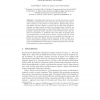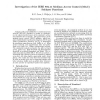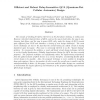352 search results - page 47 / 71 » Fail-Awareness in Timed Asynchronous Systems |
ASE
2008
13 years 8 months ago
2008
Goal-oriented methods are increasingly popular for elaborating software requirements. They offer systematic support for incrementally building intentional, structural, and operati...
ICDE
2008
IEEE
14 years 10 months ago
2008
IEEE
Sensors capable of sensing phenomena at high data rates on the order of tens to hundreds of thousands of samples per second are now widely deployed in many industrial, civil engine...
EDCC
2005
Springer
14 years 2 months ago
2005
Springer
Unreliable failure detectors are a well known means to enrich asynchronous distributed systems with time-free semantics that allow to solve consensus in the presence of crash failu...
INFOCOM
1997
IEEE
14 years 29 days ago
1997
IEEE
Analysis of the drafi IEEE 802.11 wireless local area network (WLAN) standard is needed to characterize the expected performance of the standard’s ad hoc and infrastructure netw...
DFT
2006
IEEE
14 years 12 days ago
2006
IEEE
The concept of clocking for QCA, referred to as the four-phase clocking, is widely used. However, inherited characteristics of QCA, such as the way to hold state, the way to synch...




